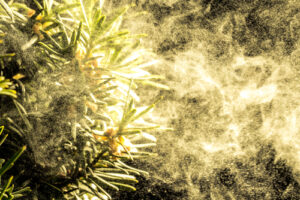Ah, spring. Flowers are blooming, birds are chirping, and you’re sneezing.
Allergy season is right around the corner. For those of us who suffer from allergies, it can be difficult to enjoy the beautiful springtime weather. This can be worsened if you have allergies and you suffer from dry eye syndrome!
Keep reading to find out what you can do if you have dry eyes and allergies and how to stay comfortable during allergy season!
Pollen can make your dry eye symptoms worse

Every allergy sufferer’s favorite pest, pollen, can make your dry eye symptoms worse. Part of the reason for this is because pollen is one of the most common allergens people are allergic to.
It’s not a coincidence then, that if you have dry eye syndrome, your symptoms can feel exacerbated in the springtime. In the winter, there is far less pollen in the air and in the areas around you.
It’s a different story altogether when it comes to the spring, as pollen is necessary to the reproduction of plants and flowers.
If you’re allergic to pollen, it’s common to suffer from symptoms like watery eyes, the sniffles, a sore throat, headaches, and in some cases even asthma!
What can you do to tolerate allergy season with dry eyes?
There will always be pollen, just like there will always be allergy sufferers. So what can you do to make allergy season with dry eye less miserable? Thankfully, there are a few things that you can try this spring!
Protect your eyes when you go outside

Sunglasses are important because they protect your eyes from the sun’s UV rays. But for people that have seasonal allergies and dry eyes, sunglasses can help protect your eyes from stray particles, dust, and pollen!
The less your eyes are exposed to the things you’re allergic to, the better.
Dust-proof your home

Have you been wondering when you should think about doing your spring cleaning? The answer is actually right now!
It may seem early, but doing this before allergy season even starts is your best course of action. When you do decide to do your spring cleaning, make sure you thoroughly dust-proof your home.
For people with allergies and dry eyes, dust is one of the worst irritants out there. Start by sweeping any hardwood floors that may have accumulated dust and debris over the winter.
Then, go room by room and clean as much as you can. The purpose here is to give dust nowhere to hide!
You may even want to consider vacuuming your furniture if you have fabric couches or chairs. If you have any curtains or drapes, make sure you vacuum them to get any dust off them as well.
Make sure to change any air filters if it’s been three months or longer since you last changed them. Now, take a deep breath!
Doesn’t it feel easier to breathe already? You’ll be in better shape for allergy season!
Keep track of pollen counts during allergy season

Living in a digital world, you have no excuse to not keep track of pollen counts during allergy season. This no longer means waking up early and watching the Weather Channel to find out how high the pollen is.
Instead, you can download an app from the Weather Channel right to your phone! The app includes a national pollen map, an animated three-day pollen forecast for tree pollen, grass, and weeds.
It also features pollen push alerts, so you can have your pollen alerts sent right to you, every day. Keeping track of the pollen count makes it easier to know when the pollen count is extremely high and helps allergy sufferers to take precautionary measures to stay comfortable.
This is important information that may affect what kinds of outdoor activities they take part in that day.
The foods you eat can help your dry eye symptoms

Of course, those that have dry eye syndrome and allergies may need medication like antihistamines. But, it never hurts to eat healthily and improve your dry eye symptoms at the same time If you want to help your eyes, consider adding the following foods to your diet:
● Kale
● Spinach
● Salmon
● Oysters
● Tuna
● Broccoli
● Peanut butter
● Oatmeal
● Walnuts
● Brussels sprouts
● Cauliflower
● Flaxseed
These foods are rich in omega-3 fatty acids. Omega-3 fatty acids have been proven to help relieve symptoms of dry eye syndrome.
Eating better and cutting out foods that are high in sugar as well as processed foods can also help reduce inflammation. Inflammation is a contributing factor for the development of dry eye.
See your eye doctor if dry eyes and allergies are overwhelming

At the end of the day, changing your diet, eating healthier, and deep cleaning your house may only do so much. If you find that you’ve tried the above tips and they aren’t helping enough, it’s time to see your eye doctor.
An eye care professional can help you come up with a treatment plan, especially if you have dry eye syndrome. For many patients with dry eye syndrome, it can take a combination of medications and lifestyle changes before their symptoms improve.
If you experience any vision changes or your eyes are bothering you, be sure to let your eye doctor know. The only way they can help you is if they know everything that is going on with your eyes.
Also, be sure to mention if you think you may have allergies. Some medications like antihistamines or prescription eye drops with preservatives in them can dry out eyes more.
Starting an open and honest dialogue with your eye doctor is your best plan for getting through allergy season with as little discomfort as possible!
Looking for an eye doctor that can help you manage your dry eye symptoms this allergy season? Schedule an appointment at See Clearly Vision in Arlington or Tysons Corner!
Now is the perfect time to prepare before allergy season begins!



















